Phone Number
925-846-9397Address
410 Longfellow Ct., Livermore, CA 94550Custom Sheetmetal
Custom Sheetmetal fabrication provides a fast, cost-effective solution for any part you need to be made. At Richards Heating & Air, we pride ourselves in providing the utmost in customer service at the best possible price. Every order we receive is processed and turned around in the fastest time possible to get you back to your job quickly.
Here’s an overview of the Process:
Design: The process typically begins with the creation of a design or blueprint for the desired component or structure. This design outlines the dimensions, materials, and specifications required for the project.
Material Selection: The choice of material depends on the intended use of the component, as well as factors such as strength, corrosion resistance, and aesthetic appeal. Common materials used in custom sheet metal fabrication include steel, aluminum, stainless steel, copper, and color clad.
Material Preparation: Once the material is selected, it is prepared for fabrication. This may involve cutting the material into the appropriate size and shape using tools such as shears, saws, or laser-cutting machines.
Forming and Bending: The next step is to shape the metal into the desired form. This is often done through bending, which can be achieved using a variety of methods, including press brakes, rollers, or specialized forming machines.
Welding and Joining: If the component requires multiple pieces to be joined together, welding or other joining techniques may be used. Welding involves fusing metal pieces together using heat, while techniques such as riveting or soldering may also be employed.
Finishing: Once the fabrication process is complete, the component may undergo finishing processes to improve its appearance or performance. This may include surface treatments such as painting, powder coating, plating, or polishing.
Quality Control: Throughout the fabrication process, quality control measures are implemented to ensure that the finished component meets the required specifications and standards. This may involve inspections, measurements, and testing to verify the integrity and functionality of the product.
Assembly and Installation: Depending on the project requirements, the fabricated components may be assembled into larger structures or systems before installation. Careful attention is paid to ensure proper fit and alignment during assembly, and the components are then installed according to the project timeline and specifications.
Custom sheet metal fabrication requires skilled craftsmanship, attention to detail, and precision to meet the unique needs of each project. Whether it’s creating architectural elements, machinery components, or industrial equipment, custom fabrication allows for the production of tailor-made solutions that can fulfill a wide range of applications.



